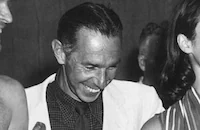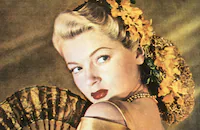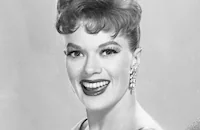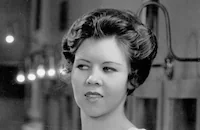Filming Bachelor in Paradise provided a welcome relief in many ways. The story, about an expert on foreign sexual mores (Bob Hope) who decides to write about life in suburbia, provided several opportunities for lampooning middle-class America. It gave Turner her only chance to work with Hope, who had long dreamed of adding her to his list of glamorous leading ladies like Dorothy Lamour, Paulette Goddard and Hedy Lamarr. And the return to MGM gave her a chance to work with old friends like cinematographer Joseph Ruttenberg and costume designer Helen Rose. But the most important benefit derived from the film was purely financial. When
Turner left MGM in 1956, she signed an agreement to make one film a year for five years at a low salary in order to get a full pension from the studio. Although Bachelor in Paradise was the only film made under that contract, it was enough to get her a $92,000 payment from the studio pension fund.
For Hope, the film was part of an attempt at more substantial material than his usual gag-filled comedies. Though he earned his share of laughs in Bachelor in Paradise, it also continued a look at life in America that had started with his previous film, The Facts of Life (1960), with Lucille Ball. Both were made as he was recovering from eye surgery, and gave him the chance to bring more depth to his work while cutting back on the more physical side of his comedy.
Bachelor in Paradise marked the third teaming for Jim Hutton and Paula Prentiss, two young comic actors who had clicked with audiences in Where the Boys Are (1960). They scored again here as the beleaguered newlyweds who almost divorce when Hutton suspects Prentiss of an affair with Hope, but their next film together, The Horizontal Lieutenant (1962), was such a flop it ended the screen team. Both went on to television work, he as detective Ellery Queen and she co-starring with husband Richard Benjamin in the situation comedy He and She. Years later, Hutton's son Timothy would win the Oscar for Best Supporting Actor for Ordinary People.
But there was one fledgling career that got a big boost out of Bachelor in Paradise. The title song by Henry Mancini and Mack David was a modest hit and won an Oscar nomination. At the ceremonies, the number was given a sizzling rendition by screen newcomer Ann-Margret, whose only film role at the time had been as Bette Davis's innocent young daughter in Pocketful of Miracles (1961). Her performance on Oscar night gave her a new image - as a sexual tigress of the first degree-and helped make her a star.
Producer: Ted Richmond
Director: Jack Arnold
Screenplay: Valentine Davies & Hal Kanter
Based on the Novel by Vera Caspary
Cinematography: Joseph Ruttenberg
Art Direction: George W. Davis, Hans Peters
Music: Henry Mancini
Cast: Bob Hope (Adam J. Niles), Lana Turner (Rosemary Howard), Janis Paige (Dolores Jynson), Jim Hutton (Larry Delavane), Paula Prentiss (Linda Delavane), Don Porter (Thomas W. Jynson), Virginia Grey (Camille Quinlaw), Agnes Moorehead (Judge Peterson).
C-110m. Letterboxed.
by Frank Miller



































